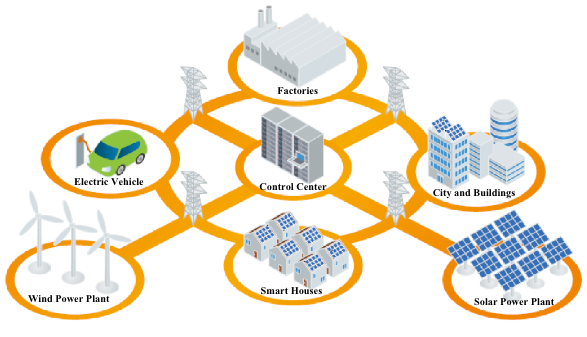Quanta Technology has a broad portfolio of services related to the development and implementation of microgrids. Our experience includes supporting utilities with some of the most complex microgrid installations to-date. As a result, we are equipped to address a wide range of questions and challenges, from big picture considerations such as systematic evaluation of microgrid alternatives versus conventional solutions to detailed technical aspects such as system interaction and protection.
Microgrids - Design and Integration
In the context of grid modernization and non-wires alternatives (NWAs), microgrids are modern solutions for minimizing the impact of sustained power outages and enhancing power quality of the grid for major customers and/or critical facilities. The key business drivers for microgrid development include reliability and resiliency enhancement, premium power quality offering for critical infrastructure, emission reduction, renewable portfolio growth, and knowledge gain on emerging technologies. Community microgrids address the reliability and resiliency issues of power supply in order to reduce the outage duration and improve the quality of delivery service. Single-customer microgrids deliver premium power quality to sensitive and critical loads (data centers, hospitals, military campus, etc.) and reduce the use of fossil-fuel-based backup generators.
Microgrids
A microgrid is a group of interconnected loads and distributed energy resources (DERs) with clearly defined electrical boundaries that act as a single, controllable entity with respect to the grid and can connect and disconnect from the grid to enable it to operate in both grid-connected or islanded mode. A microgrid development lifecycle is typically comprised of the following: 1) feasibility analysis and business case evaluation, 2) detailed design and engineering, 3) field implementation aspects requiring careful integration and testing of emerging technologies, and 4) addressing challenges associated with operation and maintenance. Quanta Technology has acted as a trusted utility partner in several projects supporting the end-to-end journey to provide quality design and engineering services. Our service offerings include the following:
Planning and Business Case
- Reliability analysis (pre/post microgrid)
- Load analysis (min/max daily load, energy consumption)
- Generation mix selection
- Conceptual design and size/footprint verification
- Benefit-cost analysis (upfront and annual) and business-case development
Technology Selection
- DER technologies and distribution assets
- DER integration and microgrid studies (steady-state and transient analysis)
- Equipment specifications
- Detailed design and engineering package preparation
Protection and Controls
- Review of protection systems (existing and new schemes)
- Protection system design and coordination studies
- Functional requirements and specifications for controllers and DERs
- Microgrid sequence-of-operation and control strategies
- Real-time hardware-in-the-loop (HIL) testing of the control and protection scheme
Implementation and Integration
- Factory acceptance testing (FAT) of key technologies and schemes (e.g., microgrid controller and sequence of operation)
- Support for testing of key technologies and integration into microgrid controls and communications
- Site acceptance testing (SAT)
- End-to-end microgrid performance testing

Why Quanta Technology?
Quanta Technology has been supporting the development of several high-profile utility-scale, commercial-type and government-sponsored microgrid projects in the last several years. Our industry experts provide a wide range of engagement at all stages of the microgrid project lifecycle including planning, design and engineering, integration, and operation and maintenance.
Industry Top Challenges
Quanta Technology experts bring a valuable knowledge base of lessons learned from other industry projects. Our team is ready to connect and propose solutions to any challenges you are experiencing with microgrids, such as:
- How does a given microgrid solution compare to other traditional planning solutions?
- What are the various types of technical and non-technical studies that should be performed for evaluating engineering design and device specifications for a microgrid?
- Is there a systematic way to technically and financially evaluate a potential microgrid candidate?
- What is the cost, revenue, and savings stream associated with a microgrid project during its lifecycle?
- What ownership models are out there, and how are they captured in business model development?
- What protection schemes are available to properly address two modes of operation (i.e., grid connected and islanding)?
- How can adequate fault current levels for fault detection and protecting the integrity of the system in islanded mode be ensured?
- How should one deal with the changes needed in the current utility practices/standards (e.g., different DER transformer topology) for microgrid design?
- What are the expected functionalities from a microgrid controller?
- How does one ensure that microgrid impacts on the system are fully investigated?
- What are the potential microgrid sequences of operation?
- Does a microgrid need Direct Transfer Trip (DTT) or is there a cost-effective alternative?
For more information contact our team.
